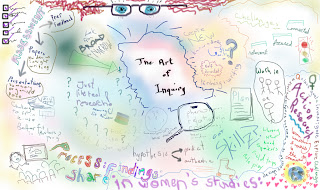Carolyn Gough, District English/Language Arts consultant states,
We as a district have tried to help teachers focus on the inquiry process through the use of units that start with an enduring understanding statement and an essential question. The cross-curricular essential question is intended as a compelling point from which students and teachers can study multiple materials that encourage thoughtful investigation and reflection and allow students to explore a question or topic.To further explore these questions, I am posting some notes I jotted down during a 2-day workshop presented by Dr. Jeffrey D. Wilhelm in early October. I am also including additional research to answer questions concerning what inquiry is; why inquiry is a preferred teaching model, and how to organize inquiry-driven teaching.
What is inquiry?
Inquiry learning emphasizes active engagement with the subject matter in a way that challenges students to seek answers on their own or with their peers. Teaching, using an inquiry approach, requires a scaffolding that provides ample support for students at the beginning stages of exploration, then gradually removes support as students become more adept at independent discovery ("Engaging Students in Their Learning" 2008).
Rigorous apprenticeship into disciplinary expertise (Wilhelm 2011).Why is inquiry important? (Organized from notes taken on Oct. 3, 2011)
- It is motivational because inquiry instruction dictates working within students' zone of proximal development (Vygotsky) - learning that helps students develop competence AND confidence.
- Motivation cannot be overemphasized.
- It is necessary to all learning.
- Motivation is defined as 'continual impulse to engage and learn.'
- Students are motivated when learning is neither too easy or too hard. Students become frustrated when hard assignments are given without help or scaffolding of some kind.
- Students are more likely to regard themselves as readers and writers; thus they will be more willing to read and write.
- Learners will be more dedicated to democratic citizenship, work, and service.
- Such experiences "rouse minds to life" (Tharp and Gallimore).
- Inquiry is the only instructional model that "meets the conditions of flow" - mental state of operation in which a person involved in an activity is fully immersed in a feeling of energized focus, full involvement, and success in the process of the activity.
Six Ms: The Inquiry Model ~
- Motivate through essential questions and substantial front loading
- Model through gradual release
- Mentor - teacher does/student helps; student does/teacher helps
- Monitor to support and to hold students accountable
- Multiple modalities - use strengths to address weakness
- Multiple measures - formative assessments
Some Suggestions ~
- Start with a guided exploration of the unit's theme, enduring understanding statement, and essential questions.
- Ex. 9th Grade, Unit 2
- Enduring Understanding Statement: Understanding what honor is helps us interpret events and behaviors.
- LA Essential Question: Is honor bestowed or inherent?
- Cross-curricular Essential Question: What is honorable?
- Possible related inquiry questions: Why is honor important?How can honor exist in a society where freedom is severely restricted?
- Using materials such as The Giver as well as informational texts, multimedia resources, etc. that support the theme, statement, and questions ...
- Proceed to student, small group inquiry about open-ended, debatable, contended issues that relate to the essential questions.
- Encourage students to discover personally relevant and socially significant issues that interest them.One of the the most difficult teaching challenges is to "get students to care about problems that are not their own."
- Support students in asking those personally relevant and socially significant issues.
- Continue work in groups to achieve diversity of views.
- Require students to predict, set goals, and define outcomes.
- Guide students through research and analysis - searching for patterns.
- Require documented research and justified conclusions.
- Sustain instruction as it serves as a guide to help students meet their goals.
- Groups/students should arrive at conclusions and share those with larger audiences.
- Encourage students to take a stand; take action. .
- Create a tangible artifact that addresses issues, answer questions, makes learning visible and accountable.
In the near future, I plan to post some sample lessons that exemplify incorporated inquiry. Stay tuned!
Renae






